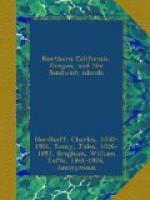A true and humane Indian policy would be to require all peaceable Indians to support themselves as individuals and families among the whites, which would at once abolish the Round Valley and Tule River reservations; to place all the nomads on reservations, under the control of picked and intelligent army officers, and to require these to ignore, except for expediency’s sake, all tribal distinctions and the authority of chiefs; to form every reservation into a military camp, adopting and maintaining military discipline, though not the drill, of course; to give to every Indian family an acre of ground around its hut, and require it to cultivate that, demanding of the male Indians at the same time two or three days of labor every week in the common fields, or on roads and other public improvements within the reservation during the season when no agricultural labor is required; to curb their vices, as a parent would those of his children; to compel the young to attend schools; to insist upon a daily morning muster, and a daily inspection of the houses and grounds; to establish a hospital for the sick; and thus gradually to introduce the Indian to civilization by the only avenue open to savages—by military discipline.
Under such a system a reserve like that of Round Valley would not to-day, after thirteen years of occupation, be a mass of weeds and litter, with bad roads, poor fences, and an almost impassable corduroy bridge over a little ditch. On the contrary, in half the time it would be a model of cleanliness and order; it would have the best roads, the neatest cottages, the cleanest grounds, the most thorough culture; and when the Indians had produced this effect, they would not fail to be in love with it.
Nor is it impossible to do all this with Indians. But it needs men used to command, well educated, and with habits of discipline—the picked men of the army. At present, an Indian reservation differs from an Indian rancheria or village only in that it contains more food, more vice, and more lazy people.
[Illustration: VIEW ON THE COLUMBIA RIVER.]
CHAPTER VIII.
THE REDWOODS AND THE SAW-MILL COUNTRY OF MENDOCINO.
Some years ago, before there was a wagon-road between Cloverdale and Mendocino City, or Big River, as it is more commonly called up here on the northern coast, the mail was carried on horse—or, more usually, on mule—back; and the mail-rider was caught, on one stormy and dark night, upon the road, and found himself unable to go farther. In this dilemma he took refuge, with his mule and the United States mails, in a hollow redwood, and man and mule lay down comfortably within its shelter. They had room to spare indeed, as I saw when the stage-driver pointed out the tree to me and kindly stopped until I examined it.
At a road-side inn I found they had roofed over a hollow stump, and used it as a capacious store-room.




